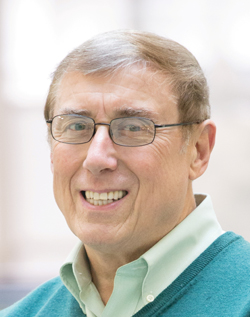Farming for Answers
.jpg) |
|
Sixty percent of India's population lives in rural areas, making rural development of great importance. |
ALBANY, N.Y. (July 11, 2016) – In India, most urban planners examine issues of congestion, pollution and poverty in its rapidly-expanding cities. Surprisingly, Ray Bromley will not be one of them.
The professor of geography and planning is spending the next six months in India, where he will set his sights on the origins and development of India’s Rural Reconstruction Movement.
As part of the Fulbright-Nehru Academic and Professional Excellence Award Bromley has received, he will be based at the School of Planning and Architecture in Delhi, where he will teach a course, Displacement and Resettlement, and give guest lectures. His main focus, however, will be on research.
As one of the highest populated countries, 60 percent of India’s population lives in rural areas, making rural development of great importance. “Rural reconstruction” is the primary alternative to a future based on corporate agribusiness. The movement seeks to revitalize the peasant economy through cooperatives, community development, organic farming, and promoting local arts and crafts, and it builds on the ideals of pioneers like the great Bengali intellectual Rabindranath Tagore, Mohandas (Mahatma) K. Gandhi, and Gandhi’s spiritual successor, Vinoba Bhave. Bromley explains his interest in personal terms: “As a descendant of many generations of family farmers in Shropshire, England, and part of the first generation to seek urban careers, I’m exploring whether small farmers and rural communities have a viable future.”
 |
|
The work Bromley does during the Fulbright Fellowship in India will contribute to a book on the global reconstruction movement. |
This is Bromley’s second Fulbright. He was granted the first in 1997 for a semester with the National Engineering University in Lima, Peru. For most of his career he has focused on Latin America and the United States; the new fellowship allows him to broaden his interest in India.
Bromley, who joined the UAlbany faculty in 1985, has already made many short visits, and has played a leading role in establishing UAlbany’s study abroad programs in India. He has taught an undergraduate course called India: Development Debates four times, and he expects to offer it on an annual basis when he returns.
Bromley is well known for his research on street and market vendors, urban informality, and various aspects of urban development in the U.S. and in Latin America. His first publications in India have focused on the work and ideas of Patrick Geddes, a Scottish intellectual who was based in India from 1914 to 1924. Geddes wrote numerous city plans, and was a pioneering advocate of historic preservation and neighborhood upgrading. The work Bromley does during the Fulbright Fellowship in India will contribute to a book on the global reconstruction movement.
![]() For more news, subscribe to UAlbany's RSS headline feeds
For more news, subscribe to UAlbany's RSS headline feeds
A comprehensive public research university, the University at Albany-SUNY offers more than 120 undergraduate majors and minors and 125 master's, doctoral and graduate certificate programs. UAlbany is a leader among all New York State colleges and universities in such diverse fields as atmospheric and environmental sciences, business, education, public health,health sciences, criminal justice, emergency preparedness, engineering and applied sciences, informatics, public administration, social welfare and sociology, taught by an extensive roster of faculty experts. It also offers expanded academic and research opportunities for students through an affiliation with Albany Law School. With a curriculum enhanced by 600 study-abroad opportunities, UAlbany launches great careers.


